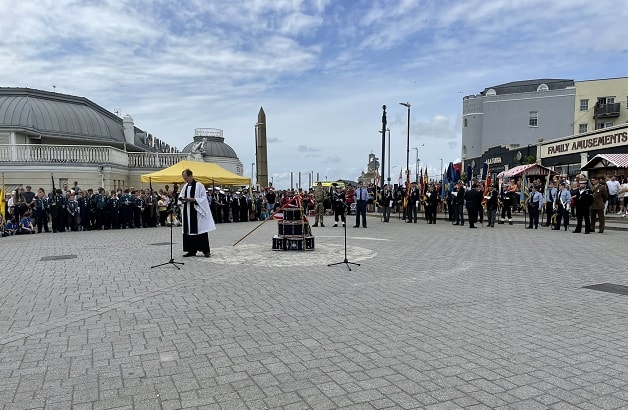
As ever, Armed Forces Day of Saturday 25th June was celebrated in proud fashion and was well organised by Ramsgate Town Council and the local Royal British Legion with an appropriate emphasis in this 40th Anniversary year of the Falklands War to commemorate the 255 British servicemen who gave their lives to retake the islands from the Argentine invading force. Lest we forget.
Regional media have been highlighting the Holiday Lets/Airbnb conundrum and the resultant lack of homes available for long-term residential rental in Thanet and East Kent (Deal has similar issues). I took part in a piece for BBC Radio Kent last week. As ever, the go to response by many is for ‘more regulation’. That’s one answer but interventions often cause other problems, not foreseen, which leads to calls for more or different regulations and we end up in a loop of tail chasing. My values are as a libertarian Conservative: we all need to think very carefully before mandating what people can and can’t do with assets that they own. We may not like what they do with them, or indeed the politics of envy can creep in and we’d rather they didn’t have them at all and reach for the high tax lever, but I’m sure you can appreciate the danger of such drift towards statism. It might seem far-fetched to envisage a time when your bank, under instruction from government, might tell you that you cannot move your funds to another institution of your choice because of a deemed ‘good’ or ‘bad’ interpretation of your decision. We are already seeing some of this in play with pension funds being nudged away from fossil fuel investments just at the time, when out of clear and present necessity, we need domestically produced oil and gas to literally keep the lights on.
My preferred strategy would be for a change to the tax system to allow for the sale, at a more reasonable rate of tax, of unoccupied second homes and allow for hundreds if not thousands of properties in Thanet to be released to the market for residential use rather than be bound up because of the tax barriers leading to zero tax being collected. There’d also be a boom in renovation and building works leading to a bounty of Stamp Duty, VAT and profits that HM Treasury would get a decent slice from in any event. We need to consider the tax system as a game of chess, thinking ahead rather than it being seen by HM Treasury as a series of single moves in isolation.
Parliament has the Northern Ireland Protocol Bill before it. There are the usual complainants that to change the protocol breaches international law, and because we signed it has to be complied with in full. These are the same people who are still fighting the Brexit battle and assess anything that comes out of Brussels and intentionally anti-British as good and anything that represents a Brexit dividend that advances and unites our country as bad. I’d recommend a perusal of the Protocol and the Withdrawal Agreement. They are both littered with clauses which allowed for and anticipated changes as its operation became tested against reality. The problem we have faced is that the EU refuses to negotiate. After 300 hours of negotiation across 18 months, a time has to come when in the absence of common-sense co-operation, unilateral action becomes a necessity. That time is now. It is remarkable that Germany is insisting that goods from Russia should be able to travel across EU territory to its anomalous enclave of Kaliningrad without facing restrictions, sanctions or tariffs but insists that the same not be allowed for goods passing from the GB mainland to Northern Ireland.
I’ll end with the cost-of-living crisis. We’re all seeing a rise in our shopping bills, a few pence here and there on most items but it is most keenly felt when we fill up the car. I know the country is saddled with huge national debt accumulated over the Covid period but we have a here and now problem and I find it frustrating when taxes and levies are part of the problem, particularly in domestic and pump energy prices, that these are not cut, even temporarily to relieve the symptoms.
Many foodstuffs are tax free – there is no VAT and many are imported without tariffs if coming from the EU and some other countries with whom we have negotiated a free-trade agreement. Looking at the Canada continuity deal, some 51,600 tonnes of medium grade wheat can be imported tariff free. After that, and we imported 440,000 tonnes in 2020 ,there is a £29.63 per tonne tariff still in place. When the world is short of wheat on the back of the Ukraine war, one has to wonder why? A similar argument can be brought against other foodstuffs. Under the EU Brexit deal we can import any amount of Spanish tomatoes, cucumbers, strawberries without tariffs. Why don’t we allow the same for Morocco? Tariffs always look appealing as a protection for UK producers. I know of no bananas grown in the UK so why do we have imports tariffs at all on such produce? Tariffs are corrosive, it is always the consumer that pays. It’s time to be more aggressive on reducing and eliminating tariffs – the consumer always wins.

